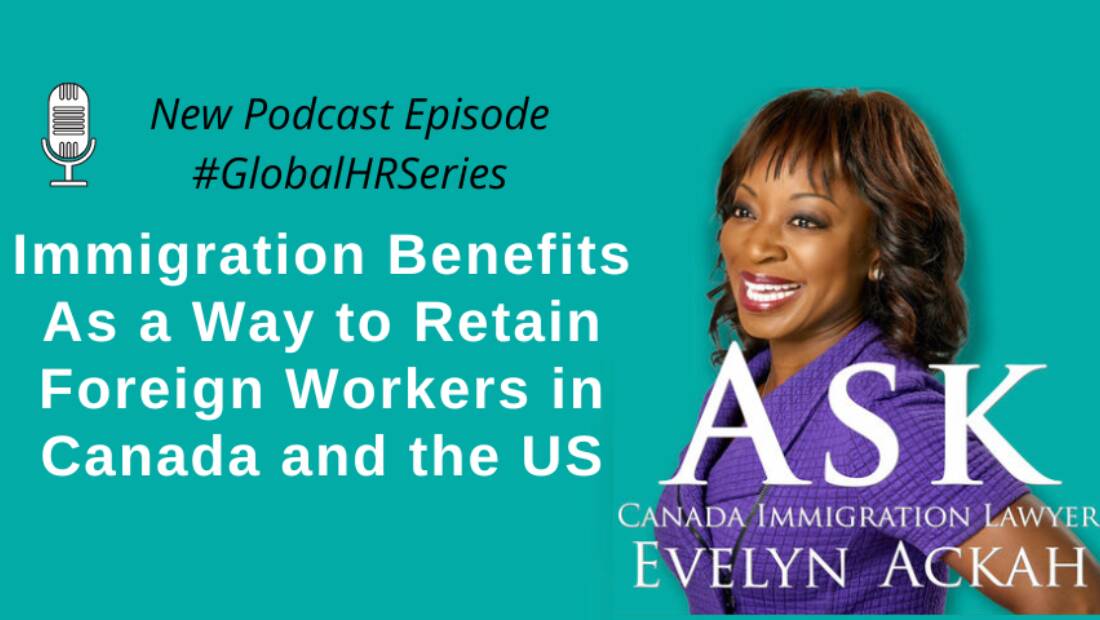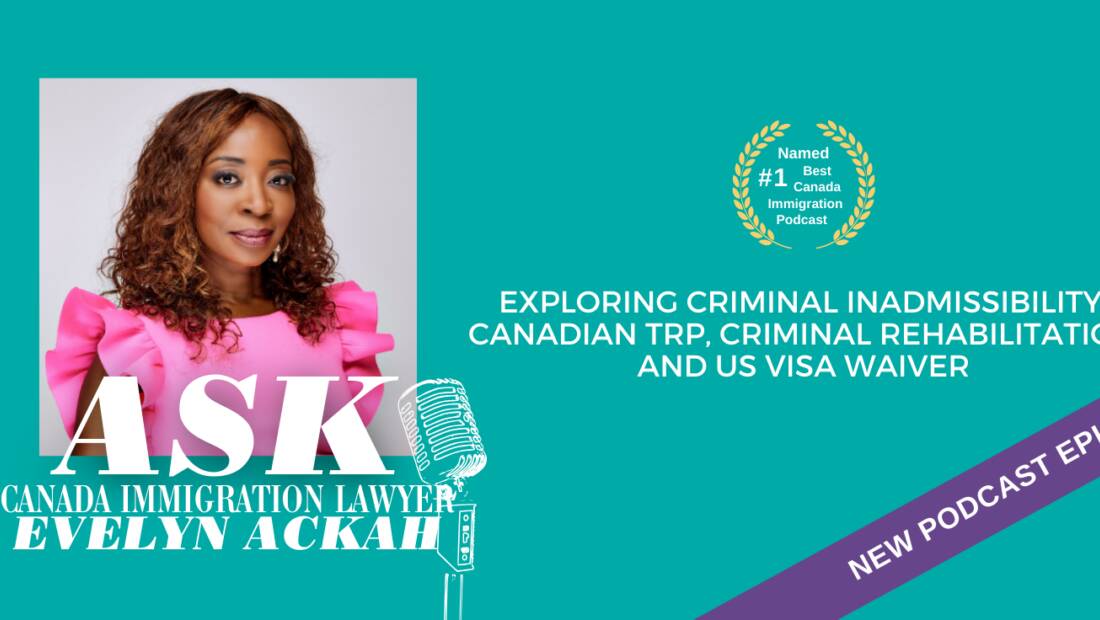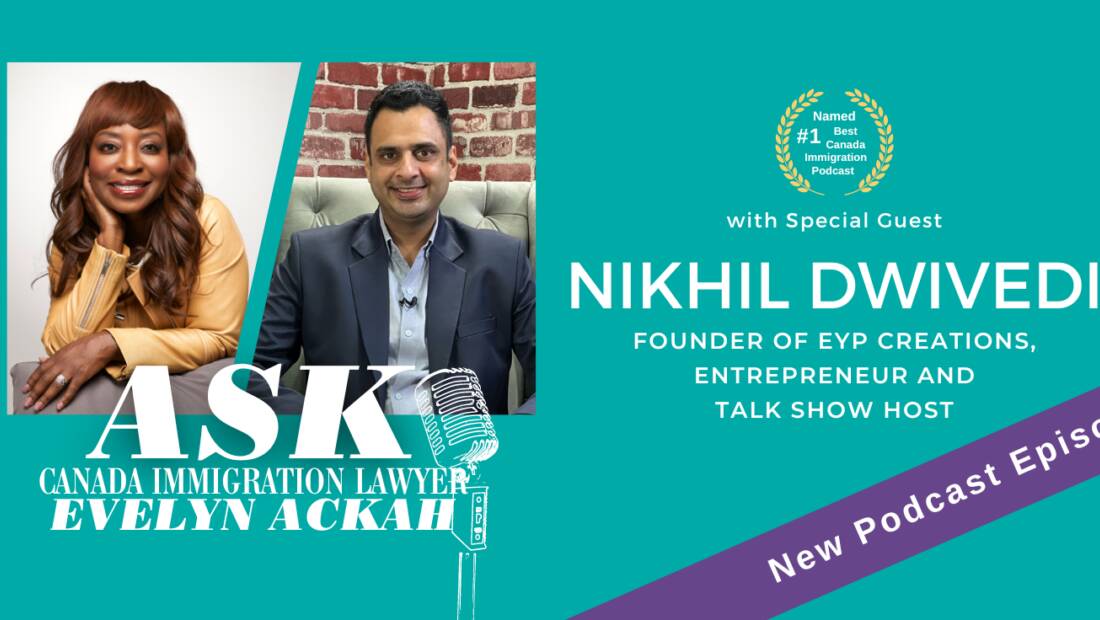Or listen on your favourite podcast app
Global HR Series
On this episode of the podcast, Calgary immigration lawyer and U.S. NAFTA lawyer Evelyn Ackah discusses how in the current tight labour market, offering immigration benefits is an opportunity for Canadian and U.S. companies to attract and retain talented foreign workers.
- why immigration benefits have become a critical employment benefit for Canadian and U.S. companies
- how the workplace and labour market are continuing to evolve as Canadian and American companies try to recover from the pandemic
- the emerging trend of highly educated foreign workers coming to Canada from the U.S.
- employee compensation to include immigration legal assistance and mentorship
- supporting spousal sponsorship to facilitate a family move
- case study: Amazon Welcome Door Program
- LMIA process and exceptions if you're LMIA exempt
- how Ackah Law can help you with this process
- foreign workers who want to become Canadian permanent residents

About Evelyn Ackah
Evelyn Ackah is the Founder and Managing Lawyer at Ackah Business Immigration Law. We work with individuals and business owners from all over the world who want to cross borders seamlessly. For more information on immigration to Canada or the United States, Ask Evelyn Ackah at Ackah Business Immigration Law today at (403) 452‑9515 or email Evelyn directly at contact@ackahlaw.com.
Transcript
Good morning, this is Evelyn Ackah from Ask Canada Immigration Lawyer and Ackah Business Immigration Law. I would like to welcome you to second webinar we've done so far this summer focused on immigration as a benefit for HR. So we're going to get started. And again, I'd like to say thank you so much for joining. We will be circulating this on social media. Those that are here, we really appreciate your presence. And for my podcast, which is called Ask Canada Immigration Lawyer Evelyn Ackah, please join if you haven't already signed up and please do give us five star Google review. It helps us so that we can continue to provide the information that we provide on a complimentary basis. So we'll get started. I'm looking forward to talking about the importance of immigration as it relates to being a benefit for employers. Okay, so let's get started again.
My name is Evelyn Ackah. I'm the founder and managing lawyer of Ackah Business Immigration Law. We are headquartered in Calgary, Alberta, Canada. We also have virtual offices in Toronto and Vancouver. Since immigration is federal, we're able to provide immigration services from coast to coast to coast in Canada, as well as we do NAFTA US immigration and we do immigration law as well, U.S. immigration with our US attorneys that we have on council.
Today, we're going to be talking immigration as a benefit. And so I'd like to just make sure that we have our agenda clearly identified here. I'm going to introduce myself and provide some background. And then we're going to talk about why. Why do we matter? Why does it matter to hire foreign talent in an organization? And then we'll talk about how to attract foreign talent. And then we'll move on to employee retention strategies and needs. And then the Canadian experience, the U.S. experience, and some tips on developing an immigration benefit policies. I'll have some case studies and examples mixed throughout this presentation so I hope it'll be of interest to you. And that if you have any questions, feel free to put them into the chat and I'll do my best to answer them. Thank you.
So again, this is me. The Ackah Law team is comprised of a wonderful group of lawyers, immigration consultants, paralegals, legal assistance, and admin staff. We focus on providing immigration advice to guide individuals, businesses, and their families to relocate to Canada and the United States, whether it's a temporary relocation for work, for employment, for school or more permanent relocation for permanent residents and eventually citizenship. My contact details can be found here. If you have any questions, feel free to reach out to us at Ackah Business Immigration Law. We'd love to assist you and the people that you know need our services to cross borders seamlessly.
So in terms of setting the stage and an introduction to the focus of this presentation and this webinar, it's very clear to everybody who is an employer, including myself, that there are definitely labor shortages across North America post Covid. During Covid, many people decided they didn't want to work full time, they wanted to change how they work, or they no longer wanted to work where they were working. And so many people have left the labour market. In the United States, I think it's something like 3 million people have left the labor market. So that is the significant amount of people that are no longer in the labour market. And same with Canada. We've had a tremendous exodus of people who've left to either start their own businesses or to stay at home or to retire early or to make dramatic changes in their lives as a result of the changes with the Covid situation and maybe they no longer want to work.
So as a result of that, we have dealing as well with the recession in Canada. There's definitely a recession. Interest rates are going up and everything is getting more expensive, including gas and food. There's likely going to be the same experience happening in the United States, just down south of us here in Canada. One of the other changes that we've noticed in terms of setting the background is, as I said, employees want to work differently. We have taught them since Covide that they can work remotely. They can work on Zoom, they can work from home, they can work part-time in the office physically and also at home. So things have changed. And to be an employer of choice, the race is on to be able to hire who you want and find the top talent. And as a result, more than ever, immigration is becoming a necessity for all businesses to consider in their workforce planning.
So why hire a foreign talent? What is it that they bring that you can't find from local talent? Done a lot of research on this, and I've also been doing immigration law for 23 years. I would tell to you that a lot of times, companies and employers hire talent because they are able to bring new skills. A lot of times, in order to even justify hiring a foreign worker, you have to be able to show that they're bringing something unique, a new skill set, some technical knowledge, a specialization and expertise. It's not just as simple bring somebody to do labour into Canada or the US. They usually have to have specialized knowledge, specialized skills and a high level of education. They also have a breadth of experience a lot of times. When they've worked internationally, they are bringing knowledge and expertise of different marketplaces that really will help the Canadian and US businesses be more competitive. That is why sometimes people want to hire foreign workers, everything from language skills to networks that they have that are international, that will all benefit the local economy and the local employer.
One other reason that people want to hire foreign workers is because they also create opportunities to access the international market based on their connections and networks. It can be very much an advantage to be able to expand into other markets by hiring a foreign worker with experience in that market so that when they join you, they can continue on with their networking and their connections to benefit their employer in Canada or the United States. One of the other benefits that I see on a regular basis is the ability to train local employees by the foreign worker. They bring the knowledge and skills not just to produce for their employer, but to also train and cross train within the organization to benefit the employees and to help bring that knowledge to our Canadian workforce and the US workforce. So these are many of the reasons why people want to consider hiring foreign talent. They're not just bringing the same all the time. A lot of times they're bringing some unique skill sets that we cannot find in Canada or the United States.
So as I finished saying earlier on the other slide, in terms of foreign talent as I've indicated, they are usually sometimes more educated or they have different education and experience in particular fields that make them really, really interesting to Canadian and U.S. employers. And they're sought out. There's a reason that an employer will go through the challenges and troubles and time and the money to find and identify and hire a foreign worker.
They bring up as well the breadth of experience because they have lived in other countries, they have grown up in other countries. A lot of times they're very international. Some of the clients we bring have lived in many, many countries. They speak several languages and they bring a unique culture and perspective to their employers and colleagues. It's been proven in all the literature that diversity makes money. At the bottom line, you need to think about the fact that having a diverse workforce allows you to expand and increase revenue because of the values and the skillset that they bring.
Another benefit is that immigrants, as I said, often speak other languages in addition to English and they can also help you as the employer access international markets. If you want to expand into the global communities, it helps to have people on your staff who understand the customs, traditions, ways of doing business so that you don't make mistakes. As you enter a new economy and a new country. You want to set yourself up for success, and hiring a foreign worker from that country into your organization will certainly assist you with that.
In terms of productivity, it's also been proven that hiring foreign workers and having a diverse workforce increases productivity. A University of Florida study has shown that having a more diverse workforce boost productivity and offers a competitive advantage for employers because in an era where flexibility and creativity are keys to competitiveness, diversity is seen as critical for an organization's success.
I have got some interesting quotes from the Globe and Mail and other publications that indicate that as the United States has tightened immigration and become less welcoming to immigrants, Canada has made shrewd policy moves to attract top global talent and capital. And I would say, this is true definitely during the Trump era. Immigration was changing the United States. There were more limitations on H-1B visa's limitations, which is the highly skilled worker visa that many highly skilled and educated workers, let's say, in Silicon Valley and other IT technical companies were coming from India, Pakistan, China, and other countries into the US to enter the US labor market. President Trump at the time wanted to limit that. He was all about America first. And that created significant impacts to immigration. People in the U.S. who are already there waiting for permanent residence started looking to Canada and other countries.
And so the fact is, how you develop your immigration policy significantly impacts who you attract and the success of your immigration programs and the reputation that your organization or your country will have internationally if you're seen to be welcoming to foreign workers versus maybe putting up some walls and making it more difficult.
Another quote is that "Canada now has six times as many skilled immigrants as the percentage of the population as our American neighbours do. A significant statistic when you consider half of the founders of America's tech unicorns, those are private companies worth a billion or more were born outside the United States." That is significant. The people who are entering the United States to expand their businesses to develop and grow their technology, many, many of them, more than half, are coming from other countries. So we cannot afford, in my mind, to limit the ability for foreign workers to enter the United States and Canada. So we'll talk later on about what the impact was of the changes to the H-1B, the L-1 visa and some of the other investment visas and starter visas in terms of the United States. Those limitations have had a direct correlation to increasing Canadian immigration because of some of the programs that we put in place to attract top high-tech talent.
So when we talk about employers attracting foreign talent, it's very clear that we're competing. We're competing with other parts of the world. Canada is competing with United States. Canada is competing with Australia and New Zealand and the United Kingdom. And so more and more, by offering the benefit of being an employer that is doing things right and is looking to bring in foreign workers as quickly as possible, we are going to be gaining the reputation as being welcoming to foreign talent, which is what we want. It helps our economy. It helps the country. It helps our training. All of it. There's been an increase in the past five to 10 years of a mobile and global workforce. And if you move individuals around the world, you have to offer incentives in order to entice them to take on the life-altering decisions that don't just impact the worker, but their entire family.
At Ackah Business Immigration Law, we focus on bringing individuals, highly skilled workers to Canada, but we also bring their families. And so that means you need always be considering how easy it is as for the spouse to work. In Canada, when you are the primary applicant and you come with your family, your spouse is eligible for an open spousal work permit just because you've received yours. This is major. It really means then that there's no issues of waiting till permanent residents, like it used to be in the old days, for the spouse to work or the spouse needing to get their own work permit through their own employer that sponsors them before they can start working and contributing to the family household revenue. And it also allows the children to go to school because of the primary applicant.
So immigration is not just about skilled workers to come to work in Canada or the US. It is the entire family unit. And as a result, you need to make it as easy as possible and as seamless as possible for them to make this very major decision, to leave all that they know behind and start fresh with the new employer in a new country.
The competition is especially fierce for those who possess high level skills. In technology, as I said, we're really seeing a growth in the need for technology. Canada is short tens of thousands of software workers in IT. Whether you're in Vancouver, Alberta, Canada, Montreal, Toronto, the Gulf area, they are desperate to find highly skilled foreign workers to come in to help them so they can continue to grow their businesses.
"There is the continuing imbalance between supply and demand for talent," said the president and CEO of Envoy. "The jobless rate is so low by historic standards and even lower if focused on college educated workers." So this whole presentation is focused on people who have education. Obviously coming to Canada and United States, it's much easier if you have a degree, if you have two degrees, if you have a Ph.D., if you have an expertise or specialization, or many, many, many years of experience in a niche area that is hard to fill. And only in that area then can we bring you to Canada and United States. Sometimes we have to justify why we're hiring a foreign worker over a Canadian or an American citizen. And so they are looking for that high level of expertise.
The current job market has favored job seekers. Clearly, it is an employee's market right now after the disruption caused by COVID. And to address these challenges, we've been seeing that solutions are being explored by businesses through new retention strategies, namely immigration benefits. So we talk about the normal benefits when you get a great job. You have health benefits, dental benefits, healthcare spending accounts, life insurance perhaps, vacation, all of those, travel insurance. All of those things, paid days off, et cetera, are benefits that are offered to employees. But now, because of immigration and the need to find foreign workers, employers are also looking at benefits in immigration support. I think this is a really great area to show an understanding of the challenges and the cost and expense that is related to immigrating to a country.
So now, employers are looking at the importance of onboarding and orientation with the lens towards the foreign workers as well because they're always also dealing with different cultures, sometimes different languages. Creating mentorship programs for the foreign worker to work closely with somebody who's already been in the organization, who's from the country so they have a nice buddy to help them understand, "This is how we do things here. We don't do things like this here" in terms of the business norms and the culture of the organization.
Employee's compensation. Obviously, that is a benefit in terms of getting paid. And so the other thing that's important is whether you're in Canada and the US when you are hiring a foreign worker, you must pay prevailing wage. And that means you cannot hire a foreign worker and pay them less than you would pay a Canadian or an American citizen. So that means they're going to usually be banking even more money than where they might have been making from home.
There are lots of perks that come as well when you're an employee, whether it's extra food or the fridge is full or flexibility and work from home, all those things are perks. Wellness offerings are normal as well in terms of taking care of yourself and taking advantage of the gym and other kinds of athletic and health wellness programming. Training and development, work-life balance. Acknowledgements of milestones. If you've worked for five years, acknowledging that. 10 years, the loyalty acknowledgements. Continuous feedback on performance is one of them and flexible work arrangements. These are more of the traditional benefits that were offered to employees, but now they're offering more.
So some of the things that we're seeing as I've already gone through in terms of enhancing retention are listed below, compensation, appreciation, rewards and recognition, promotion, opportunities for growth, work-life balance, participation in decision-making, work environment and job security. In Canada, we've seen that some companies are providing immigration benefits as a way to retain employees. So in Canada, to bring somebody in as a foreign worker, there are different streams that we'll talk about shortly such as the labor market impact assessment where you have to sponsor a foreign worker and justify why hiring them over a Canadian. You have to be able to look at, "Is there a treaty? Can we benefit from NAFTA if we're bringing in an American or a Mexican into Canada to get them here working as quickly as possible?" But when they get here, then what happens? Is the employer saying, "Well, you're here. You're on your own."?
Employers we're seeing are doing more to support in terms of guidance for application completion, also training and long-term employment opportunities, mentoring programs, language and culture classes, which is really, really helpful, sponsorship for permanent residents, support for Canadian citizenship application. See, these companies, RBC, Google Canada and Scotiabank, some of them have been the ones that have started providing immigration benefits. And so what I would suggest is if you are a Canadian employer and you've brought a foreign worker, besides that initial cost of bringing them, the relocation costs, meeting them at the airport, making sure that they are housed and find housing, et cetera, you have to think about what happens next. So the cultural training is very important. The language training is very important so they understand the norms and what the languages that they are using. And also helping them with legal fees so that they can move forward in their process.
It's an expensive venture once you come as a work permit holder. Now, most companies say, historically, "You're on your own for permanent residence." We've been seeing now that more companies are supporting permanent residents for their employers. One thing to keep in mind as an employer, you have to be very careful. As an employer in Canada, you cannot complete immigration applications and forms and submissions for your employee. Only, only immigration lawyers and immigration consultants can produce work on behalf of a client for submission as a representative. And so you have to be very careful as an employer not to get outside with the law and possibly be in breach of the immigration regulations by helping your employee. So by offering, instead, legal services to help them that you pay for, then that lawyer and that employee are on their own to work together and to be able to provide the necessary support for permanent residents and then even possibly citizenship.
So, as I said, RBC, Google Canada and Scotiabank have done a great job of looking at offering immigration benefits as a way to retain foreign workers. Given that permanent residents can take now up to two years and they bring you, let's say, as a foreign worker, helping you stay there and finish your process to become a permanent resident is another means of a retention strategy. In the US experience, there have been movements have called for improving, as I mentioned before, the US immigration system. In the Trump era, there was a real shrinking of immigration options. We saw, at that time, a number of foreign workers in the United States looking to Canada because the H-1B caps were significant and the long, long period of time for processing to even be invited and welcome to finish green card processing for permanent residents. Some countries were taking up to 10 years based on nationality. It was just crazy. They may not even be selected or invited or even gain their permanent residents. And so they started looking elsewhere.
There are certainly shortcomings in the existing U.S. immigration system. Change is needed to address the significant labour market shortages and revitalize the economy. I am hearing from a number of my colleagues and other immigration lawyers in the U.S., they can't even... Other lawyers. Period. That they can't find bodies. They can't find skilled workers or people who want to work. It's also increasing the salaries of those that are working because they're looking for ways to retain. So if you are an employer and you have some foreign workers on staff, by offering services like legal support for permanent residents for them and their entire family or helping them become citizens, giving them training to prepare for the testing for language and English writing, or even the naturalization test, those things build a lot of loyalty and they keep the employee there for as long as possible to finish their process.
One of the concerns highlighted is the U.S. green card and temporary visa process. It's inefficient. They are so backlogged since COVID and they've always been quite slow. And even if you pay for premium processing, things are not happening as quickly as we need them to and people's lives are being impacted. So as I said, we have been seeing a number of people moving to Canada. And we're going to talk about some case studies as well so you have a better understanding of why immigration benefits are a really great strategy as an employer.
In the past five years, Ackah Law has seen a marked increase in highly educated foreign workers coming to Canada from the United States. I mentioned before that when people are getting close to capping out on their H-1B visa and they have no other options to stay, employers are looking to Canada to incorporate a related entity if they didn't already have one. So we can help with that at Ackah Law. And then they are transferring that foreign worker to Canada to work for the Canadian entity so that they might be on the same time zone at least versus sending them back to India or Pakistan or China or wherever they came from. Instead, if they're working in Silicon Valley, they might move them to Vancouver. So they're on the same time zone, they can work from there and continue to benefit the company, both in Canada and the United States. This is definitely related to, as I mentioned, the H-1B cap issues.
Now, also depending on the country of origin, as I mentioned, it could take up to 10 years to gain permanent residence. In Canada, once you come as a foreign worker, most times you work for 12 months, you can apply for sponsorship or for permanent residence after 12 months, which means that within three years of arriving, you could be a permanent resident. And after another three years, you could be a Canadian citizen. That's less than the 10 years it would take some people to become just a green card holder in the United States.
So as a result, high technology employers from the US are looking north to Canada to transfer their valuable foreign workers as I've indicated from countries such as India, Pakistan, China, Japan, to the related entities in Canada. We have so many different streams to bring people into Canada as well as move them to permanent residents from inside Canada.
One of the strategies that I wanted to highlight is the case study with Amazon. They have created in April of this year the Welcome Door Program, which is Amazon's refugee and humanitarian based immigrant employees program which they give access to those employees for additional benefits to help support them. And this will be coming to Canada, I think they said in the fall with Amazon Canada as well. So one of the things that they give as a benefit is Reimbursement for Employment Authorization Document renewal fees, which on average costs $500 every other year. So it allows them to keep working while they're moving through whatever immigration process they're in. They also have created a citizenship assistance portal that fully supports us citizenship applications for eligible employees. This is great because a number of people are eligible, but they don't have the time to prepare for citizenship or they don't have the money to apply for US citizenship. Amazon is assisting with that support.
Ongoing communications internally that highlight policy changes that might impact an employee's immigration status. So there are a number of DACA workers in the U.S. who have challenges to kind of become permanent residents. And so Amazon is looking hard to share information as things change to make sure they're kept up to date and they know what's happening so they can better prepare themselves to apply for things. It is also offering free legal resources to help navigate immigration-related questions and the ability to connect with immigration experts and lawyers.
So this is a very much a value-added that Amazon is providing. And they provide skills training opportunities including free college tuition and English of the second language through Amazon's Career Choice Program. This is really an incredible program for an organization, obviously as large as Amazon, who recognizes they have staffing challenges too and if they're not willing to hire foreign workers and people that may be coming to the states and try to normalize their status and to support them, they can't be able to keep them and they won't be able to continue growing. As simple as that.
So there's some tips I've offered here, and you feel free of course to contact us at Ackah Law, but there's some tips here around developing an immigration benefits program for your own organization. In Canada, one of the best ways to bring a foreign worker to Canada is under the Labor Market Impact Assessment process. This is the LMIA a process where the employer must advertise for at least one month in three to four places with very specific advertising. If the ads are not done right, you've just lost a month in your process. So we always suggest you reach out to a lawyer, whether it's us or anybody else, with experience with the LMIA process.
Once the LMIA has been up for one month, then you submit the LMIA application. And then within a month to two months, if everything is approved, you'll get an LMIA a confirmation. And that is basically approval from our employment labour department that allows you to hire a foreign worker because you have made the case as to why this person versus the Canadian. And sometimes it's because you can't even find any Canadians to apply. And then that person oversees will be able to apply for the work permit and their visa and come to Canada.
The other way to come to Canada is if you're visa exempt, I'm sorry, if you're LMIA exempt such as intercompany transfer from any country and you already have a Canadian entity, you can bring your foreign workers to work in Canada. And maybe it's benefit of a promotion or an opportunity to get international experience and come and experience the Canadian entity for a couple years and learn and go back. But that's one of the ways to come to Canada. The other way would be under NAFTA or some of the treaties where people can come into Canada under a specific treaty based on their country of citizenship. So we'll talk about that shortly.
Employers should also consider what are the essential skills that your foreign worker needs to be able to be successful in their job. Once you identify that, then you want to be able to offer it such as training, mentorship, ESL classes, business writing classes, those are all things that are advantages when you have a benefits program targeted at your immigrant and foreign worker employees. You also want to provide diversity in cross-cultural training to all members of your company, not just the people that come as foreign workers.
In all my years of doing immigration law, the companies that are not successful within immigration programs are those that don't also educate the Canadians and the permanent residents who are already here working for them as to the value and the importance and the benefits of having foreign workers and the need for cultural diversity. So I think if you can integrate that and actually also train the entire workforce, you're going to have a much better job of transitioning your foreign workers successfully.
So how can Ackah Law assist you with this process? We process LMIA applications and we have a very, very high success rate, over 95%, I would say, because we have to do everything step by step by step. It's a meticulous process and it's not an easy process that anybody could try doing on their own. I recommend you work with a professional. We also, also do the global talent stream, which is the LMIA process that is focused and targeted on highly skilled and highly educated people in the software and IT industry. Usually, people with a master's degree, making at least 85,000 or more thousand dollars a year, their LMIA a process can be expedited and it'll take two weeks to get the LMIA. And then you're able to get to Canada as quickly as possible.
We also focus, as I mentioned, for an intercompany transfers from all over the world into Canada. We have a number of clients we do this for, from India, from China, from all other countries, from Nigeria, to who have businesses that are successful in their home country, in the US who want to then establish or transfer to their Canadian entity.
So these other treaties are ones that are available, such as NAFTA Professionals, the GATS, General Agreement and Trade and Services is for mostly a lot of Western European countries. There are some treaties that make coming into Canada as a foreign worker possible and easier, the Canada-Chile Treaty and we also have a Canada-Peru Treaty. So sometimes people don't realize there are a number of special treaties between Canada and other countries that facilitate transfers, facilitate bringing the professional coming in as a consultant or as a trades person.
At Ackah Law, we provide full-service support to obtain work permits as well as incorporating and establishing entities. We do that as well. We also have our U.S. attorneys that assist us that we can also bring in if you actually want to not just expand to Canada, but also expand to the United States. We're here to provide full service support for you and your employees until they become citizens of Canada.
The system information about how we can assist at Ackah Law, we provide flat fee pricing. You know at the beginning once you've done a consultation with us what the price will be. No matter how long it takes, no matter how many emails are exchanged and matter how many telephone calls we have with you, the price remains the same. We offer 24/7 global support so that you can contact us as needed when you're travelling, your foreign workers entering Canada to make sure they're prepared, and we're on call when they're coming to Canada. And we focus on proactive legal solutions and we clearly have integrity and commitment. The team that we have loves the work we do and we're passionate about immigration. Most of us are immigrants as well, and so it's very personal to us. We have a combined experience level of 60 years or more. As I get older and older, it keeps going up and up.
So we'd love to tell you more about the services we provided at Ackah Law. I hope that this presentation has been helpful to you and has given you some insight into the need for immigration benefits now more than ever as a way to attract employees. If you were to identify somebody you wanted to bring in and you say, "In addition to relocation, when you get here, we also provide all these other benefits to get you to permanent residents and your family, to get you to citizenship," it creates loyalty and it creates real long term employees, which is what you want when you're investing in a foreign worker. It's a considerable investment and you want it to pay off. So I highly recommend employers begin offering increased benefits for their foreign worker employees.
If you have any questions at all and you like to talk more about this, please do give me a call at Ackah Business Immigration Law. We're at 403-452-9515. Thank you so much for joining me today and I look forward to speaking with you again soon. Take care. Bye-bye.












